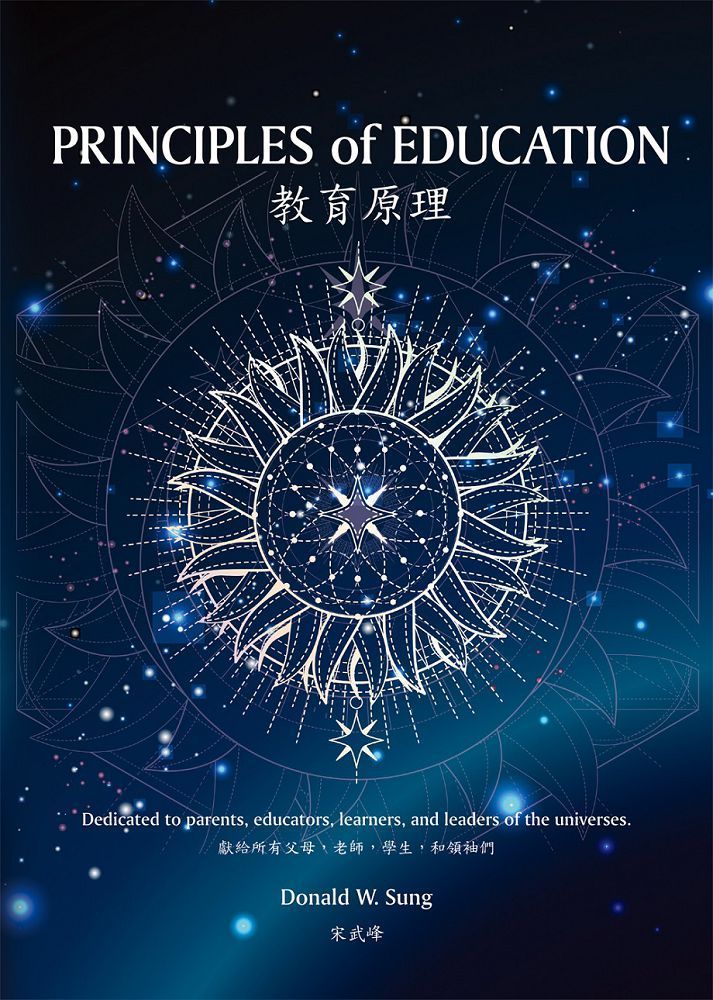商品編號:DJAF2L-A900FZZRM
教育原理(精裝)
驚喜優惠
$284
$360
- P幣
全盈+PAY單筆消費滿1200回饋80P幣(限量)
- 登記送
【全家】單筆滿$350純取貨/取貨付款訂單登記送日式稻荷壽司兌換券乙張(限量)
付款方式
- 信用卡、無卡分期、行動支付,與其他多種方式
- PChome 聯名卡最高6%,新戶再享首刷禮1000P
出貨
配送
宅配滿$490免運,超取滿$350免運
- 宅配到府(本島/低溫)滿$699免運
- 宅配到府(本島/常溫)滿$490免運
- 超商取貨(常溫)滿$350免運
- 超商取貨(低溫)滿$699免運
- i郵箱(常溫)滿$290免運
銀行卡、行動支付
優惠總覽
商品詳情
作者: | |
ISBN: | 9786267253212 |
出版社: | |
出版日期: | 2023/03/01 |
內文簡介
<內容簡介>
以81個原理,從全方位的角度建立兒童教育理論架構,與孩子們一起成長,帶孩子們進入美妙的世界
◎根據學習者自身條件、生長環境,以及學習過程有關的各種原理,所發展出來的一套兒童教育理論。
◎本書能使孩子的智力、情感以及人際關係,隨著成長和生理狀況的變化而不斷的同時發展。
◎作者同時兼具法學博士、MBA、律師、會計師多種專業身分,中英對照,精闢解析。
The author is an attorney and C.P.A. Throughout his life, he has been questing and exploring common grounds for people and concluded that childhood education is the foundation for people, families, society, and the future of the world. He is very appreciative of the opportunities and education offered by society. In this book, he shares his principles of education as a giving back to society.
作者是位執業律師暨會計師。他一輩子在找尋人間的共通之處,得到兒童教育正是人們、家庭、社會及未來世界之基石的結論。他非常感激社會給他的教育和機會。在此書中分享了他的教育原理來回饋社會。
●This book shows you ways to
這本書告訴你如何去
‧Discover how people learn
發覺人們是怎麼學習的
‧Guide our children
引導我們的孩子們
‧Review effectiveness of education
檢討教育的效率
‧Explore tools for education
探尋教育之工具
‧Grow with children
與孩子們一起成長
‧Introduce children to a wonder world
帶孩子們進入美妙的世界
Dedicated to parents, educators, learners, and leaders of the universes
獻給所有父母、老師、學生和領袖們
★目錄:
Acknowledgments
致謝
Preface
前言
Part I - Learner’s State 第一部 – 學習者的狀況
1. Body Function Curve Principle
身體功能發展原理
2. Gross Capacity Principle
整體能力原理
3. Free Capacity Principle
可供自由使用的能力原理
4. A Person’s State Principle
個人狀況原理
5. Potential of a Person Principle
個人學習潛力原理
6. Learning and Physiology Correlation Principle
學習與生理相關性原理
7. Trammel State Principle
阻礙狀態原理
8. Principle of Physical and Mental State Co-Relationship
身體與心理交互作用原理
9. Principle of Latency in a Person’s Change of Physical and Mental State
一個人的身體與心理狀況改變的潛伏期原理
10. Dominant State Principle
顯性狀態原理
11. Recessive State Principle
隱性狀態原理
12. Critical State of Existing Knowledge Principle
知識臨界點(關鍵點)原理
13. Information Management Principle
資訊管理原理
14. Ideal Education Principle
理想教育原理
15. Pursuance of Betterment Principle
追求更好原理
16. Motive Principle
動機原理
17. Desire Principle
渴望原理
18. Motivation Principle
驅策力量原理
19. Action Principle
行動原理
20. Self-Sufficiency Principle
自給自足(不用依賴別人)原理
21. Confidence Principle
信心原理
22. Principle of Comfort Zone
舒適圈原理
23. Effect of Education Principle
教育效果原理
24. Act in Time Principle
及時行動原理
25. Limited Resources Principle
有限資源原理
26. Relevant Factors Principle
相關因素原理
27. Learning Path Principle
學習途徑原理
28. Priority Principle
優先順序原理
29. Time Factor Principle
時間因素原理
30. Knowledge Accumulation Principle
知識累積原理
31. Personal Condition Principle
個人狀況原理
Part II - Learner’s Interactions with Environment 第二部 學習者與環境的互動
32. Environment Principle
環境原理
33. Trust Factor Principle
信賴因素原理
34. Critical State for Learning Principle
學習的關鍵狀況原理
35. Window of Opportunity for Learning Principle
學習機會窗口原理
36. Dwindling Window of Opportunity for Learning Principle
學習機會窗口逐漸變小原理
37. Development of Learner’s Potential Principle
學習者潛能發展原理
38. Education Priority Principle
教育優先順序原理
39. Bond Principle
人際關係原理
40. Distancing Principle
保持距離原理
41. Family Tie Principle
家庭關係原理
42. Family Education Principle
家庭教育原理
43. Total Education Principle
全面教育原理
44. Connection Principle
關聯原理
45. Attachment Principle
親近感原理
46. Transmission Princip29
傳播原理
47. Imperfection Principle
不完美原理
48. Education Limit Principle
終極教育原理
49. Approaching an Education Goal Principle
接近教育目標原理
50. Principle of Tool
工具原理
51. Principle of Guidance
輔導原理
Part III - Introducing a Learner to the World 第三部 引領學習者踏入現實世界
52. Group Principle
群體原理
53. Principle of Stage
階段原理
54. Principle of Growing Stage
成長階段原理
55. Principle of Maintenance Stage
(Dedicated to Dr. George Forman on 12/24/2021)
維持階段原理 (獻給喬治福爾曼博士12/24/2021)
56. Principle of Open Communication
公開溝通原理
57. Principle of Over-Expressive
過度表達原理
58. Outreach Motive Principle
擴大動機原理
59. Principle of Outreach
延伸原理
60. Principle of Demand
要求原理
61. Principle of Conflict
衝突原理
62. Partial Conflict Resolution Principle
部分解決衝突原理
63. Conflict Duration Principle
衝突持續期間原理
64. Principle of Conflict Resolution
衝突解決原理
65. Principle of a Window of Opportunity for Conflict Resolution
解決衝突機會窗口原理
66. Principle of Setback
挫敗原理
67. Principle of Giving
贈與原則
68. Principle of Negotiation
協商原理
69. Principle of Holdback
裹足不前原理
70. Principle of Incentive
誘因原理
71. Principle of Competition
競爭原理
72. Principle of Associatio6
聯誼原理
73. Principle of Sharing
共享原理
74. Principle of Round Robin
環狀溝通原理
75. Principle of Cross-Communication
橫跨溝通原理
76. Principle of Structured Organization
結構性組織原理
77. Training Principle
訓練原理
78. Principle of Team
團隊原理
79. Principle of Teamwork
團隊合作原理
80. Principle of Team Leader
團隊領導原理
81. Adjustment Principle
調整原理
Glossary
語彙表
<作者簡介>
宋武峰(Donald W. Sung)
Donald Sung是一名律師和註冊會計師,他一生都在尋找和探索人們的共同點,並總結出兒童教育是人、家庭、社會和世界未來的基礎。他非常感激社會提供的機會和教育。在這本書中,他分享了他作為回饋社會的教育原則。
About Donald Sung:
Donald Sung is an attorney and C.P.A. Throughout his life, he has been questing and exploring common grounds for people and concluded that childhood education is the foundation for people, families, society, and the future of the world. He is very appreciative of the opportunities and educations offered by society. In this book he shares his principles of education as a giving back to society.
★內文試閱:
‧前言
Preface
前言
The human brain and the human body are very complicated, and so is human education. This book presents a childhood educational theory with a system of principles of a learner’s conditions, environment, and educational processes.
人的大腦和身體結構非常複雜,因此人的教育也不容易一蹴可幾。本書介紹一套兒童教育理論,它是根據和學習者自身條件、生長環境以及學習過程有關的各種原理所發展出來的一套思想體系。
The system recognizes that a child’s intelligence, emotions, and social interactions continue to develop in tandem with his growth and bio-physical conditions. This is a system with dynamic principles, such as the time factor principle, the pursuance of betterment principle, and the latency in a person’s change of physical and mental state principle. These principles may vary with time and should be applied in tandem with the changes in the learner’s condition as well as his learning environment.
這個思想體系考慮到孩子的智力、情感以及人際關係會隨著他的成長和生理狀況的變化而不斷同時發展。它的原理常常是動態的,如時間因素原理、追求改善原理、人的身心狀態變化潛伏期原理等。這些原則可能會隨時間而變化,應與學習者狀況和學習環境的變化同步推出應用。
The system attends to the negative impacts and other side effects of an educational process. These unwanted side effects may accumulate and cause potential difficulties and problems in the future.
該系統關注教育過程的負面影響以及其他副作用。這些不必要的副作用可能會累積
並在未來造成潛在的困難和問題。
Education impacts a child throughout his life, which is why this system presents principles, such as maintenance stage principle and conflict resolution principle, that may be consistently applied throughout children’s lives.
教育會影響孩子的一生,這就是為什麼該系統提出的原則,例如維持階段原則和衝突解決原則,可以應用在孩子的一生中始終如一。
More than one principle in the system may be applied to a learner’s situation. An effective guidance may be created by applying a combination of these principles.
可以同時應用系統中一個以上的原則以應付學習者的情況。可以通過應用這些原則的組合來創建有效的指導。
The principles are divided into three groups: learner’s state (functions and conditions), learner’s interactions with environment, and introducing a learner to the world. These principles are interdependent. Hopefully the readers may internalize and combine them into a complete educational theory.
這些原則分為三組:學習者的狀態(功能和條件),學習者與環境的互動以及引導學習者踏入社會。這些原則是相互依存的。希望讀者可以將它們內化並組合成一個完整的教育理論。
Donald W. Sung, J.D., M.B.A.
May 25, 2022
宋武峰 (唐納宋) 法學博士/企管碩士
2022 年 5 月 25 日
‧摘文
Part I - Learner’s State 第一部 – 學習者的狀況
1. Body Function Curve Principle
身體功能發展原理
Each body part or condition has its own function curve.
每個身體部位或狀況都有它們自己的功能發展曲線。
Corollaries to Body Function Curve Principle
身體功能發展曲線原理的推論
A. A person’s heart functions vary with the time.
人的心臟功能會隨時間而變化。
B. A newborn baby first learns to breathe, then learns to drink.
剛出生的嬰兒先學會呼吸,然後才學會喝奶。
C. A newborn baby spends most of his time and energy in growth and rest.
新生嬰兒大部分時間和精力都花在成長和休息上面。
D. During infancy, a baby learns how to use ears, eyes, arms, legs, and the rest of the parts of his body.
人類在嬰幼兒期間,學習如何使用耳朵、眼睛、手臂、腿和身體的其他部位。
2. Gross Capacity Principle
整體能力原理
A person’s gross capacity varies with time, physical and mental state, and his environment.
一個人的整體能力會隨時間、身體與心理狀況、以及他所處的環境而改變。
Corollaries to Gross Capacity Principle
整體能力原理的推論
A. A person’s gross capacity is limited.
一個人的整體能力有限
B. A person’s gross capacity may be reduced by fatigue and increased with a proper rest.
一個人的整體能力會因為疲倦而降低,也會因為得到充分休息而增加。
3. Free Capacity Principle
可供自由使用的能力原理
A person’s free capacity is the difference by deducting the person’s committed capabilities from his gross capacity.
一個人可供自由使用的能力指的是他的整體能力扣掉他先前運用所剩的能力。
4. A Person’s State Principle
個人狀況原理
A person’s state at any point of time is the accumulation of the person’s conditions in all dimensions, or areas, including but not limited to the person’s physical and mental conditions, educational background, experiences, the surrounding environment, connections, and communications with other people.
一個人在某一時刻的個人狀況指的是他在各方面或各領域條件的總和,包括但不局限於他本人的身體與心理條件、教育背景、經歷、周遭環境、人際關係以及跟別人的溝通情形。
Corollaries to Person’s State Principle
個人狀況原理的推論
A. Physical illness may affect a person’s learning, depending on the toll of the illness on the person and on the subject matter to be learned.
身體疾病可能會影響一個人的學習,影響多大要看該疾病對他的損傷程度以及他所欲學習的科目性質而定。
B. Positive existing knowledge may help a person’s learning, the effectiveness of which depends on the direction, depth, lapse of time, and other relevant factors regarding the existing knowledge.
一個人現有的正面知識可幫助他的學習。是否有效就要看現有知識的方向、深度、學習間隔時間以及其他因素而定。
C. A person’s relationship with family or community members may affect that person’s learning positively, negatively, or in a way of partially positive in some dimensions and partially negative in other dimensions.
一個人與家人或鄰居的關係會對他的學習有正面的、負面的影響或者某些方面有正面
影響,而其他方面則有負面作用。
D. A person’s state is different from one another’s, and his state changes from time to time.
一個人的狀況不同於他人的狀況,而個人的狀況會隨時間而異。
5. Potential of a Person Principle
個人學習潛力原理
A person’s potential for learning at any point of time depends on the intended target, the suitability of the information available, the transmission of the information, and the state of the person.
在任何時間點一個人的學習潛力會依學習要達成的目標性質,能取得的資訊是否合適,該資訊的傳輸是否理想,以及個人的狀況是否良好而定。
6. Learning and Physiology Correlation Principle
學習與生理相關性原理
Learning correlates with a person’s physiology.
學習與個人的生理現象互有關聯。
Corollaries to Learning and Physiology Correlation Principle
學習與生理相關性原理的推論
A. A person’s sense organs input information for learning.
一個人透過感覺器官輸入學習所需的訊息。
B. The information inputs into a person’s short-term Memory.
訊息先傳輸到個人的短暫記憶。
C. The information is organized and stored into a person’s long-term Memory.
訊息經過整理後才會儲存到個人的長期記憶。
以上內容節錄自《教育原理》宋武峰(Donald W. Sung)◎著.白象文化出版
更多精彩內容請見
http://www.pressstore.com.tw/freereading/9786267253212.pdf
‧‧‧ ‧‧‧ ‧‧‧
Principles of Education by Donald Sung
〈Donald Sung的教育原理〉
Childhood education, according to Donald Sung, is the foundation for people, families, society and the future of the world. Sung has addressed this belief in his scholarly work Principles of Education (Barnes & Noble Press), in which he defines and details 81 principles that parents, educators and learners need to consider to maximize a child’s learning.
Donald Sung認為,兒童教育是人、家庭、社會和世界未來的基礎。Sung在他的學術著作《教育原理》(Barnes & Noble Press)中闡述了這一信念,他在其中定義並詳細說明了父母、教育工作者和學習者需要考慮的81條原則,以最大限度地提高孩子的學習效果。
Together, the principles make up a childhood educational theory that tackles a learner’s conditions, environment and educational processes.
這些原則共同構成了解決學習者條件、環境和教育過程的兒童教育理論。
The author, an attorney and CPA by trade, elaborated on his book and its concepts in this recent Q&A.
作者是一名律師和註冊會計師,在最近的問答中詳細闡述了他的書及其概念。
Q: Why did you write Principles of Education?
問:你為什麼要寫《教育原理》?
A: I appreciate the education and opportunities given to me by society. This is the best way for me to give back to society. I am a problem solver. It seems to me that the threat to mankind’s existence is growing greater along with the advancement in technology. No one has a better answer regarding how to solve this problem. I believe that childhood education is the best (if not the only) solution to the complicated situations in the future of the world.
A:我很感激社會給我的教育和機會。這是我回饋社會的最好方式。我是一個問題解決者。在我看來,隨著科技的進步,對人類生存的威脅越來越大。關於如何解決這個問題,沒有人有更好的答案。我相信兒童教育是解決世界未來複雜情況的最佳(如果不是唯一)解決方案。
Q: How have you identified and developed the 81 principles that make up your book?
問:您是如何確定和發展構成您的書的81條原則的?
A: Through my experience in teaching babies, toddlers, children, youngsters, adults, middle ages and senior persons, I learned the importance of teaching principles that may last throughout a person’s lifetime. Through my own education in science school, business school, law school, music school and education school, I learned the importance of teaching principles that can be applied across all disciplines. I collect the principles, which have been used to teach my own children, refine them to their finest forms, and make them readable to ordinary people so that my audience may benefit and contribute to the peace of the future world.
A:通過我教嬰兒、學步兒童、兒童、青少年、成人、中年和老年人的經驗,我了解到可以貫穿人一生的教學原則的重要性。通過我自己在科學學院、商學院、法學院、音樂學院和教育學院的教育,我了解到可以應用於所有學科的教學原則的重要性。我收集了那些曾被用來教導我自己的孩子的原則,將它們提煉成最好的形式,並讓普通人可以閱讀它們,以便我的聽眾可以受益並為未來世界的和平做出貢獻。
Q: Who is your target audience for this book?
問:這本書的目標讀者是誰?
A: Parents are my primary target. Furthermore, childhood education is ongoing 24 hours a day. Not only teachers and leaders will be involved, but also children will be involved. It is critically important that all teachings be conducted on a common ground, or with the same set of educational principles. Otherwise, the discrepancies in education may produce unpredictable, positive or negative, effects on the children. Childhood education is a teamwork among parents, learners, educators and leaders. This book provides a common ground for the team. All team members are my target audience.
A:父母是我的主要目標。此外,兒童教育每天24小時不間斷進行。不僅老師和領導會參與,孩子們也會參與。至關重要的是,所有的教學都必須在共同的基礎上進行,或者採用同一套教育原則。否則,教育上的差異可能會對孩子產生不可預測的正面或負面影響。兒童教育是父母、學習者、教育者和領導者之間的團隊合作。這本書為團隊提供了一個共同點。所有團隊成員都是我的目標受眾。
相關分類
購物須知
| 寄送時間 | 全台灣24h到貨,遲到提供100元現金積點。全年無休,週末假日照常出貨。例外說明 |
|---|---|
| 送貨方式 | 透過宅配送達。除網頁另有特別標示外,均為常溫配送。 消費者訂購之商品若經配送兩次無法送達,再經本公司以電話與Email均無法聯繫逾三天者,本公司將取消該筆訂單,並且全額退款。 |
| 送貨範圍 | 限台灣本島與離島地區註,部分離島地區包括連江馬祖、綠島、蘭嶼、琉球鄉…等貨件,將送至到岸船公司碼頭,需請收貨人自行至碼頭取貨。注意!收件地址請勿為郵政信箱。 註:離島地區不配送安裝商品、手機門號商品、超大材商品及四機商品。 |
| 售後服務 | 缺掉頁更換新品 |
| 執照證號&登錄字號 | 本公司食品業者登錄字號A-116606102-00000-0 |
關於退貨
- PChome24h購物的消費者,都可以依照消費者保護法的規定,享有商品貨到次日起七天猶豫期的權益。(請留意猶豫期非試用期!!)您所退回的商品必須回復原狀(復原至商品到貨時的原始狀態並且保持完整包裝,包括商品本體、配件、贈品、保證書、原廠包裝及所有附隨文件或資料的完整性)。商品一經拆封/啟用保固,將使商品價值減損,您理解本公司將依法收取回復原狀必要之費用(若無法復原,費用將以商品價值損失計算),請先確認商品正確、外觀可接受再行使用,以免影響您的權利,祝您購物順心。
- 如果您所購買商品是下列特殊商品,請留意下述退貨注意事項:
- 易於腐敗之商品、保存期限較短之商品、客製化商品、報紙、期刊、雜誌,依據消費者保護法之規定,於收受商品後將無法享有七天猶豫期之權益且不得辦理退貨。
- 影音商品、電腦軟體或個人衛生用品等一經拆封即無法回復原狀的商品,在您還不確定是否要辦理退貨以前,請勿拆封,一經拆封則依消費者保護法之規定,無法享有七天猶豫期之權益且不得辦理退貨。
- 非以有形媒介提供之數位內容或一經提供即為完成之線上服務,一經您事先同意後始提供者,依消費者保護法之規定,您將無法享有七天猶豫期之權益且不得辦理退貨。
- 組合商品於辦理退貨時,應將組合銷售商品一同退貨,若有遺失、毀損或缺件,PChome將可能要求您依照損毀程度負擔回復原狀必要之費用。
- 若您需辦理退貨,請利用顧客中心「查訂單」或「退訂/退款查詢」的「退訂/退貨」功能填寫申請,我們將於接獲申請之次日起1個工作天內檢視您的退貨要求,檢視完畢後將以E-mail回覆通知您,並將委託本公司指定之宅配公司,在5個工作天內透過電話與您連絡前往取回退貨商品。請您保持電話暢通,並備妥原商品及所有包裝及附件,以便於交付予本公司指定之宅配公司取回(宅配公司僅負責收件,退貨商品仍由特約廠商進行驗收),宅配公司取件後會提供簽收單據給您,請注意留存。
- 退回商品時,請以本公司或特約廠商寄送商品給您時所使用的外包裝(紙箱或包裝袋),原封包裝後交付給前來取件的宅配公司;如果本公司或特約廠商寄送商品給您時所使用的外包裝(紙箱或包裝袋)已經遺失,請您在商品原廠外盒之外,再以其他適當的包裝盒進行包裝,切勿任由宅配單直接粘貼在商品原廠外盒上或書寫文字。
- 若因您要求退貨或換貨、或因本公司無法接受您全部或部分之訂單、或因契約解除或失其效力,而需為您辦理退款事宜時,您同意本公司得代您處理發票或折讓單等相關法令所要求之單據,以利本公司為您辦理退款。
- 本公司收到您所提出的申請後,若經確認無誤,將依消費者保護法之相關規定,返還您已支付之對價(含信用卡交易),退款日當天會再發送E-mail通知函給您。

